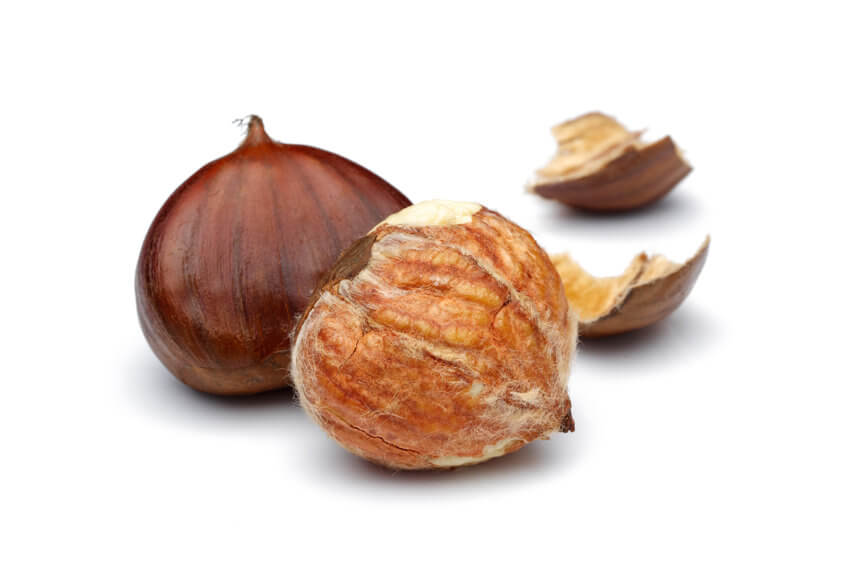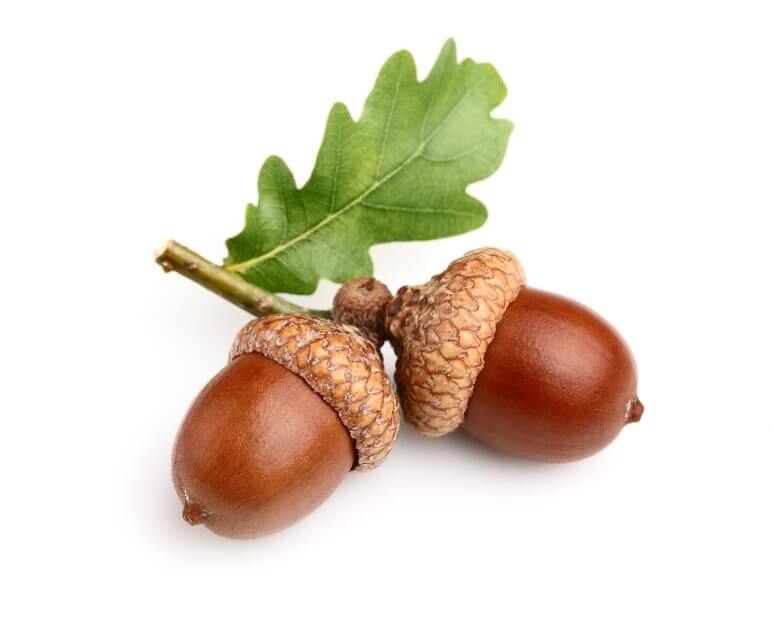Both chestnuts and acorns are nut varieties that you won’t commonly see in bags of trail mix or used as dessert toppings. Today we’ll be examining these lesser-utilized nut varieties as we compare chestnuts vs acorns and all of the ways they differ.
In short, the main difference between chestnuts vs acorns is that chestnuts contain fewer calories, less fat, more minerals, and more vitamins per serving– particularly vitamin C. Acorns, on the other hand, contain fewer carbohydrates and more protein per serving.
Let’s have a look at some of the other ways these two nuts differ.
What Are Chestnuts?
Chestnuts are rather unique in the world of nuts. Nuts in general tend to be high in fat and low in carbohydrates, but the inverse is true of chestnuts. Most of the calories in chestnuts come from carbohydrates.

Chestnuts are mostly grown in the northern hemisphere, in temperate regions particularly. They contain a hard outer shell that must be cracked before eating, but only once they are cooked.
Since chestnuts contain tannic acid in their raw state, which is believed to be toxic when consumed in excess, they must be boiled or roasted before they can be safely eaten.
When eaten, chestnuts come with a plethora of health benefits. According to WebMD, they support good heart health and can help improve digestion.
What Are Acorns?
Acorns (also known as oak nuts) are hardly a mystery to most. They are a nut of the oak tree, which exists in abundance. In fact, you may even have some in your own backyard.

Did you know that acorns can be eaten, though? That’s right– they’re not just for the squirrels. Once soaked or boiled, acorns can be eaten like any other nut.
Much like chestnuts, though, raw acorns contain tannic acid that can be harmful when consumed. However, it can be leached out by soaking or boiling the acorns before eating them.
Thanks to their nutritional contents, acorns also come with their own share of potential health benefits. According to WebMD, they are rich in antioxidants and may help improve gut health.
Chestnuts VS Acorns
Now that we’ve gone over the basics of each nut, let’s have a look at how they compare with each other.
How They’re Eaten
One of the biggest differences between chestnuts vs acorns is how they’re consumed.
In their whole form, chestnuts must be cracked from their shell once cooked. Unlike other types of nuts, chestnuts have a chewy, meaty texture.
When purchased, they usually come shelled and in jars or plastic packaging and are most commonly consumed as a snack.
Acorns, on the other hand, do not seem as commercially available as chestnuts are. In fact, a quick search on Amazon.com yielded no results for acorns.
This means that if you’d like to eat acorns, you’ll have to go foraging through the wilderness (or your driveway) to locate some, and then prepare them yourself.
When cooked and eaten, acorns are said to have a sweet, nutty flavor, according to a WikiHow user.
Nutrition Facts
Now let’s examine how chestnuts and acorns differ in terms of nutrition.
The table below compares a 100-gram serving of chestnuts with an equal weight serving size of acorns:
| Item | Chestnuts | Acorns |
| Serving Size | 100g | 100g |
| Calories | 245 | 387 |
| Total Carbohydrates | 53g | 41g |
| Fiber | 5.1g | N/A |
| Total Fat | 2.2g | 24g |
| Protein | 3.2g | 6.2g |
| Vitamin C | 43% DV | 0% DV |
| Vitamin E | 2% DV | N/A |
| Vitamin K | 10% DV | N/A |
| Calcium | 3% DV | 3% DV |
| Iron | 5% DV | 4% DV |
| Magnesium | 8% DV | 15% DV |
| Potassium | 17% DV | 11% DV |
| Zinc | 4% DV | 5% DV |
| Copper | 25% DV | 69% DV |
| Selenium | 2% DV | N/A |
As you can see, each nut is rich in vitamins and minerals. However, one truly does stand out above the other.
Chestnuts Contain Fewer Calories
One of the biggest advantages you’ll enjoy when opting for chestnuts vs acorns is that they contain fewer calories per serving. This is likely because chestnuts aren’t as high in fat– the most calorically-dense macronutrient.
Calories are the unit of measurement used to gauge the energy we consume. Eating more calories than your body can use results in weight gain, whereas eating less calories than your body can use is associated with weight loss, according to the Harvard School Of Public Health.
This means that if your goal is to consume fewer calories, opting for chestnuts over acorns will give you the advantage of being able to consume a greater quantity of food for less calories.
They’re Also Denser In Nutrition
Despite containing fewer calories, chestnuts are somehow denser in most vitamins and minerals than acorns are.
Chestnuts contain more:
- Vitamin C
- Vitamin E
- Vitamin K
Additionally, they also contain more minerals, such as:
- Iron
- Potassium
- Selenium
That said, it should be noted that acorns do contain more of certain types of minerals, such as magnesium, zinc, and copper.
Chestnuts Contain Vitamin C
An often overlooked benefit of chestnuts, they are one of the only nuts to contain vitamin C.
Vitamin C, also known as ascorbic acid, is a water-soluble vitamin that acts as an antioxidant. According to the National Institutes of Health, vitamin C helps protect cells from free radical damage. It also plays a role in immune health and producing colagen.
Those seeking to boost their vitamin C intake will be happy to hear that just a modest 100-gram serving of chestnuts provides a whopping 43% of the Daily Value for vitamin C!
Chestnuts Are Significantly Lower In Fat
Another advantage of choosing chestnuts vs acorns is that the former contains significantly less fat.
A 100-gram serving of chestnuts will provide you with only 2.2g of fat per serving— a pittance compared to most nuts. Acorns, on the other hand, pack a whopping 24g of fat.
Acorns Contain More Protein
One area where acorns have the advantage over chestnuts is their protein content. Acorns contain roughly double the amount of protein as chestnuts do, clocking in at 6.2g of protein per 100-gram serving.
Protein is important for building and repairing muscle tissue, making it essential for those engaged in physical activity such as weightlifting and playing sports.
While both nuts are a decent source of plant-based protein, if you’re looking for a higher-protein option, acorns are the way to go.
The Bottom Line
Considering all of the differences between chestnuts vs acorns, it’s easy to see which is the more practical option if given the choice.
Not only are chestnuts more nutritionally dense than acorns, but they also contain fewer calories. Furthermore, they offer more convenience too in that they’re widely available for purchase.
Unless you’re eager to grab a rake and collect your snack from the backyard, it may be best to leave the acorns to the squirrels.

